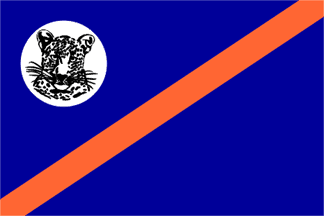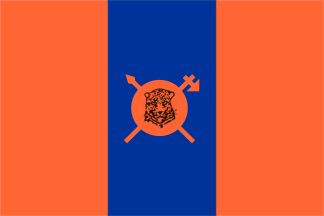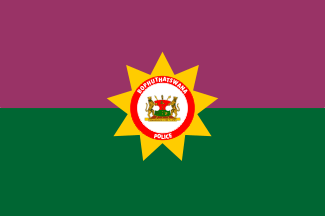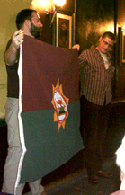bop-1.gif) image
by Martin Grieve, 08 Dec 2006
image
by Martin Grieve, 08 Dec 2006
Last modified: 2007-07-14 by bruce berry
Keywords: south africa | homeland | bophutatswana | leopard's face | bop |
Links: FOTW homepage |
search |
disclaimer and copyright |
write us |
mirrors
 image
by Martin Grieve, 08 Dec 2006
image
by Martin Grieve, 08 Dec 2006
Bophuthatswana was a relatively large territory, vastly dispersed across the
central to western
Transvaal and into the north-eastern
Cape Province (today's northwestern-most
Mpumalanga
and North-West Province). Six main parts, three of which,
smaller, in Transvaal (with the easternmost one briefly bordering
KwaNdebele),
and two other (one of which quite large) in the Cape
Province; the sixth,
very uncompact shaped unlike the others, stretching between the two provinces
and extensively bordering Botswana.
Antonio Martins, 30 May 1999
There was a portion of Bophuthatswana in Orange
Free State at Thaba Nchu - about 50 km east of Bloemfontein (today
in the Free State province).
Bruce Berry, 31 May 1999
bop-1.gif) image
by Martin Grieve, 08 Dec 2006
image
by Martin Grieve, 08 Dec 2006
In the Bophuthatswana flags the leopard's head seems to be the one really
used. Perhaps it was taken from the first design adopted by the Legislative
Assembly in 19 April 1972, that was red over green horizontal with white
circle in center and within it a leopard's head and rejected November 1973
when the well know flag was adopted.
Jaume Ollé, 12 Apr 2001
Regarding the former flags of the South African homelands;
- how much did the actual flags of the homelands differ from the original
specifications, and why?
- how much variation was in between different specimens of the same flag?
- what is the reason for the widely differing representations in flag
publications?
Marcus Schmöger, 28 Jan 2007
The simple answer to the questions is manufacturer's licence. There was some
variation in the flags made by the various manufacturers, most notably the
detail for the leopard's head in the flag of Bophuthatswana and the Blue Crane
in the flag of Ciskei. As reported on FOTW, despite the
specifications of the
Ciskei flag as described in the Ciskei Flag Act not conforming to the official
artcard, the proportions of the blue and white stripes were followed as per the
artcard and not as per the specifications. This could possibly explain the
variations in various flag publications (which was actually the official
specification???). However, one manufacturer produced flags showing the twig in
the beak of the Blue Crane (as was the case in the Coat of Arms) although this
was never specified for the flag. This manufacturer subsequently won a Ciskei
Government contract to supply flags and despite the error being pointed out (by
me actually!!!), the flags were made and the contract honoured!
The majority of the variations were with the Ciskei flag, while the others were
quite minor being mainly different colour shades and in the case of
Venda, different fonts were used for the "V".
Bruce Berry, 08 Feb 2007
 image by Martin Grieve, 08 Dec 2006
image by Martin Grieve, 08 Dec 2006
The flag of the Bophuthatswana Army
is in proportion 2:3 and consists of three equal vertical stripes of orange,
green and orange, charged with the Bophuthatswana Defence Force badge in the
centre of the green stripe. The badge comprises a yellow roundel bearing a
leopard's face surper-imposed on a yellow spear and Tswana battle axe in saltire.
The leopard's face is taken from the Bophuthatswana national flag.
Bruce Berry, 08 Dec 2006
 image by Martin Grieve, 08 Dec 2006
image by Martin Grieve, 08 Dec 2006
The flag of the
Bophuthatswana Defence Force is in proportion 2:3 and consists of three equal
vertical stripes of orange, blue and orange, charged with the Bophuthatswana
Defence Force badge in the centre of the green stripe. The badge comprises an
orange roundel bearing a leopard's face surper-imposed on a orange spear and
Tswana battle axe in saltire. The leopard's face is taken from the
Bophuthatswana national flag.
Bruce Berry, 08 Dec 2006
 image
by Martin Grieve, 08 Dec 2006
image
by Martin Grieve, 08 Dec 2006
The Bophuthatswana Police flag registered with the South African Bureau of Heraldry
on 20 February 1984 with the following description:
A rectangular flag, proportions three by two, consisting
of two horizontal bands of equal width, maroon over green, charged in the
centre with the badge of the Bophuthatswana Police (to wit: a facetted
nine-pointed star Or, charged with an annulet Murry bearing the name BOPHUTHATSWANA
POLICE in letters Or, there-within on a plate the arms of the Republic
of Bophuthatswana, proper).
Source: Data
of the Bureau of Heraldry on registered heraldic representations.
Mark Sensen, 19 May 2002
 sent
by Jens Pattke, 15 Nov 2004
sent
by Jens Pattke, 15 Nov 2004
Here is a photo from the German Vexillological Meeting in held in Jena, 2004.
The Bophuthatswana Police flag is horizontally divided dark red (to brown) and
green with the police badge in the centre. Thanks to flag supporters Jorg Karaschewski and Dr. Andreas Herzfeld. Both
vexillologists are members of German Vexillological Society.
Jens Pattke, 15 Nov 2004
bop-p.gif) image by Martin Grieve, 08 Dec 2006
image by Martin Grieve, 08 Dec 2006
The flag of the Bophuthatswana Police
is in proportion 2:3 and consists of two equal horizontal stripes of maroon over
olive green. The badge of the Bophuthatswana Police is placed in the centre of
the flag and comprises a yellow nine-pointed star charged in the centre on a
white field with the coat of arms of Bophuthatswana in full colour within a red
annulet bearing the words BOPHUTHATSWANA POLICE in white letters.
Bruce Berry, 08 Dec 2006
bop.gif) scan by Bruce Berry, 08 Dec 2006
scan by Bruce Berry, 08 Dec 2006
By Government Notice No. 1599, published in the South African Government Gazette (Number 3644 of 08 September 1972) it was notified that a coat of arms had been registered for the Tswana Legislative Assembly in terms of the South African Heraldry Act (Act No. 18 of 1962). Although application and registration was made in terms of the Heraldry Act (Government Notice 1599 in Government Gazette 3644 of 08 September 1972), the State Herald did not issue a formal certificate of registration in respect of these arms as they had been devised without consultation of the Bureau of Heraldry.
These Arms were retained by Bophuthatswana at independence and are described and illustrated in Section 2 of the Republic of Bophuthatswana Constitution Act (Act No. 18 of 1977). The blazon of the coat of arms is described as:
Arms:
Per fess (at nobril point) Gules and Vert, in chief a mine headgear, in base
dexter three grain sorghum ears seeded in bend, and sinister an ox head caboshed
in bend sinister, the shield interlaced palewise of a traditional plumed staff;
behind the shield an assegai and battle-axe in saltire, Or.
Supporters: Two leopards gardant proper.
Motto: TSHWARAGANANG
LO DIRE PULE E NE (If
we stand together and work hard we will blessed with rain).
With the re-incorporation of Bophuthatswana into South Africa in April 1994,
these Arms are no longer in use.
Bruce Berry, 01 Dec 1998